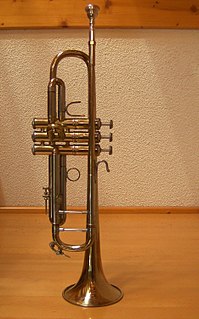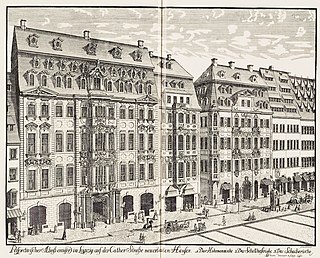Related Research Articles

Carl Friedrich Abel was a German composer of the Classical era. He was a renowned player of the viola da gamba, and produced significant compositions for that instrument.
The trio sonata is a genre, typically consisting of several movements, with two melody instruments and continuo. Originating in the early 17th century, the trio sonata was a favorite chamber ensemble combination in the Baroque era.

In music, a trio is any of the following:
František Kočvara, known later in England as Frantisek Kotzwara, was a Czech violist, virtuoso double bassist and composer. He is perhaps more famous for the notorious nature of his death. The first episode of the second series of the British TV show Sick Note is named for him.
Anna Bon was an Italian composer and performer. Her parents were both involved in music and traveled internationally; her father was Girolamo Bon, a Bolognese librettist and scenographer, and her mother was the singer Rosa Ruvinetti Bon.
Winfried Michel is a German recorder player, composer, and editor of music.
Jiří Družecký was a Czech composer, oboist, and timpanist.

The Sonata in E major for flute and basso continuo is a sonata for transverse flute and figured bass composed by J. S. Bach in the 1740s. It was written as the result of a visit in 1741 to the court of Frederick the Great in Potsdam, where Bach's son Carl Philipp Emanuel had been appointed principal harpsichordist to the king the previous year. It was dedicated to Michael Gabriel Fredersdorf, the king's valet and private secretary, who, like the king, was an amateur flautist.
Carlo Besozzi was an Italian oboist composer and member of an extensive family of oboists from the eighteenth-century Naples. Nephew of Gaetano Besozzi, he was employed in the orchestra of the Elector of Dresden and travelled extensively throughout Europe with his father, playing in London, Paris, Stuttgart and Salzburg, where he received good notices from Leopold Mozart.
Giovanni Benedetto Platti was an Italian Baroque composer and oboist.

Johann Christian Schickhardt was a German composer and woodwind player.

The trumpet repertoire consists of solo literature and orchestral or, more commonly, band parts written for the trumpet. Tracings its origins to 1500 BC, the trumpet is a musical instrument with the highest register in the brass family.
Cristoforo Besozzi was an Italian oboist, bassoonist and founder of a large family of wind players very influential around Parma, Naples and Turin for more than 200 years. In 1700, he settled in Parma, taking part as oboist in the ducal hautboy band Guardia Irlandese with his son Giuseppe Besozzi in 1711. His other two sons, Alessandro and Paolo Girolamo Besozzi, joined him from 1714.
Giuseppe Besozzi was an Italian oboist. In the eighteenth century the Besozzi family produced several important oboists who worked in Turin, Naples, London, Paris and Dresden. Giuseppe's brothers Alessandro Besozzi and Paolo Girolamo Besozzi lived in Turin, and his sons Antonio Besozzi in Naples and Gaetano Besozzi in Paris and London. Antonio Besozzi's son Carlo Besozzi worked in Dresden and Gaetano's son Girolamo Besozzi, the grandfather of the composer Louis Désiré Besozzi, worked in Paris.
Paolo Girolamo Besozzi was an Italian oboe virtuoso and bassoonist who devoted his life to the study of the bassoon and oboe. He was born in Parma. Together with his brothers Giuseppe and Alessandro Besozzi, he took part from June 1714 in the ducal hautboy band Guardia Irlandese, created in 1702 by Antonio Farnese, Duke of Parma, and remaining in service until his nephew Antonio Besozzi succeeded him on 30 December 1727.

The Sonata in G major for two flutes and basso continuo, BWV 1039, is a trio sonata by Johann Sebastian Bach. It is a version, for a different instrumentation, of the Gamba Sonata, BWV 1027. The first, second and fourth movement of these sonatas also exist as a trio sonata for organ.
Claudio Brizi is an Italian organist and harpsichordist.
References
- 1 2 Comune di Parma. "Besozzi, famiglia" (in Italian). Biblioteche dell'a Comune di Parma. Archived from the original on 6 February 2012. Retrieved 26 July 2012.
- 1 2 Boer, Bertil Van (2012). Historical Dictionary of Music of the Classical Period. Scarecrow Press. p. 78. ISBN 978-081-087-183-0.
- ↑ Besozzi, Luciano (2001). De Besutio (Le famiglie Besozzi). Lulu.com. p. 85. ISBN 147-091-694-0.
- ↑ Burgess, Geoffrey (2003). The premier oboist of Europe: a portrait of Gustave Vogt. Scarecrow Press. p. 39. ISBN 081-084-851-1.
- ↑ Georg Druschetzky (2006). Quartet no. 4 in G minor for oboe, violin, viola and violoncello: from a manuscript in Budapest, Hungary, Issue 4. Classical Winds Press. 59614436.